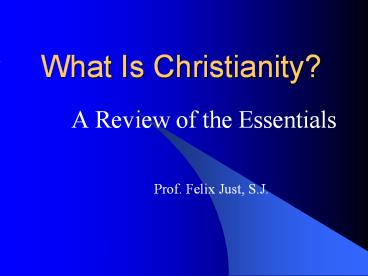What Is Christianity? - PowerPoint PPT Presentation
Title:
What Is Christianity?
Description:
What Is Christianity? A Review of the Essentials Prof. Felix Just, S.J. What Is Christianity? Introduction: Christianity is a major world religion, A Western ... – PowerPoint PPT presentation
Number of Views:47
Avg rating:3.0/5.0
Title: What Is Christianity?
1
What Is Christianity?
- A Review of the Essentials
- Prof. Felix Just, S.J.
2
Introduction
- Christianity is a major world religion,
- AWestern religion (w/ Judaism Islam)
- The largest world religion today (ca. 2 billion)
- It is based on belief that Jesus of Nazareth is
the Christ ( Messiah) the Son of God. - Like most other major world religions,
Christianity has several core aspects - I) History Development
- II) Core Beliefs Practices
- III) Structures Regulations
3
I-A History
- Historical BackgroundAbraham, Israelites,
Hebrews, Jews, OT - Historical FoundationJesus of Nazareth
(crucified ca. AD 30) his first
disciples/apostles - Historical DevelopmentTradition
preserved/adapted 2000 years (interplay of both
old new, ancient modern)
4
I-B Branches Subdivisions
- Major Christian Branches(Eastern) Orthodox,
(Roman) Catholic, Anglican, Protestant,
Restorationist, etc. - Orthodox, Anglicans, ProtestantsO by nation
language Greek, RussianA by nations esp.
former British coloniesP by leaders/theologies
Lutheran, Reformed - Groups within Catholicismreligious orders
societies (monastic, mendicant, apostolic, etc.),
lay groups
5
I-C Demographics
- Number of Christians World-wide 2 billion in
2000 33 of world population - Subdivisions1 bill. Catholics 500 mill.
Protestant/Anglican 250 mill. Orthodox 250
mill. Other - of Populations48 Africa 85 N. America
93 S. America 9 Asia 76 Europe 85
Oceania
6
II-A Foundational Texts
- The Bibleofficial collection of books, in two
parts both Old Testament New Testament - The Creedsshort professions of faith, defined
by first two Ecumenical Councils Nicea
Constantinople - Other Writingswritings of Church leaders
throughout history,esp. founders of orders
denominations
7
II-B Core Theological Beliefs (Dogmas
Doctrines)
- One God in Three Persons (Trinity) Father /
Almighty / CreatorSon / Jesus / Christ / Savior
/ LordHoly Spirit / Giver of Life / Paraclete - World Humanscreated by God, in Gods image,
with free will originally good, but corrupted
by sin/death - Church, Salvation, Eschatology community of
believers body of Christ resurrection of the
body eternal life
8
II-C Core Ethical Teachings
(Commandments Precepts)
- Foundational Principlesdo good avoid evil
love God, others, selfdevelop an informed
conscience - Sexual Moralitydual purpose of sex consistent
ethic of life human relationships central
role of family - Social Ethicsdignity of each person common
good care of the poor/needy work,
participation, property
9
II-D Religious Practices
- Calendar, Feasts, FestivalsAdvent
Christmas Lent Easter saints days local
universal festivals - Public / Communal Worshipofficial liturgies,
rites, rituals, Sacraments, esp. Baptism
Eucharist Sunday worship - Private / Individual Spiritualityprayer,
devotions, pilgrimages, asceticism,retreats,
pious/spiritual practices, etc.
10
III-A Church Organization
- Churches Denominationshistorical divisions
always! esp. 1054, 1517but also reunifications
mergers - Structures with each Churchindiv.
parishes/congregations, local dioceses, national
conferences, international associations - Leaders within each Churchbishops (incl. Pope,
cardinals), priests, deacons, lay ministers
pastors, elders, etc.
11
III-B Internal Regulations
- MembershipWho can join? What is the process?
(evangelization catechesis initiation) - LeadershipHow are leaders chosen? Who is
eligible? - DisciplineWhat are members leaders
obligations?Sanctions and punishments? (Canon
Law)
12
III-C External Relations
- Ecumenical Relationsdialogues between Christian
denominationsbilateral international groups
(WCC) - Inter-religious Relationsdialogues with other
major world religionsesp. with Judaism Islam
(historically close) - Church/State Relationscooperation or tensions
with political, social, economic, and other
secular institutions?
13
REVIEW
- History Development
- Historical Foundations Development
- Branches, Divisions, Demographics
- Core Beliefs Practices
- Foundational Texts Bible, Creeds, etc.
- Central Teachings Theological Ethical
- Common Practices Liturgical Spiritual
- Structures Regulations
- Organization, Leadership, Membership
- Internal Rules External Relations
14
Final Exam Essay Questions
- What are the core beliefs and practices of
Christianity? (What is common to all Orthodox,
Catholic, and Protestant Xns?) - What are some of the most important differences
in theology and praxis between Orthodox,
Catholic, and Protestant Xns? - What was (and still is) the impact of the Second
Vatican Council on Christianity (both the
Catholic Church and others)? - Describe the typical processes of Christian
Initiation (Baptism-Confirmation-Eucharist)?
Differences for Orthodox, Catholics, Protestants?
Differences for infants vs. adults in
Catholicism? - Describe the wide variety of Christian
"vocations" (how God "calls" Xns to live
religious lay historical differences etc.) - What are "Scripture" and "Tradition"? How are
they related in Catholic theology? in other
branches of Christianity?
15
Final Exam Practical Tips
- I encourage you to study together with your
regular group or with other students. - Bring several pens, one small Blue Book, your
Bible, and your one page of notes. - The Exam will take most students about two hours
some a little more or less. - Study Well Good Luck!































